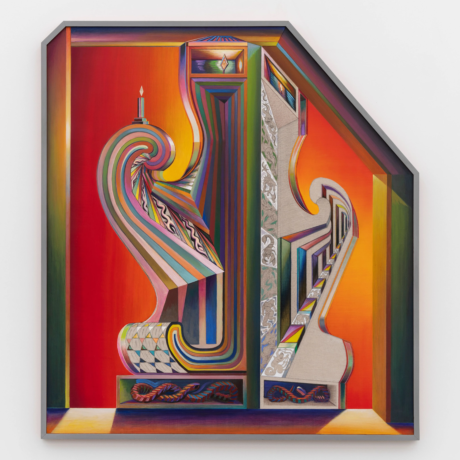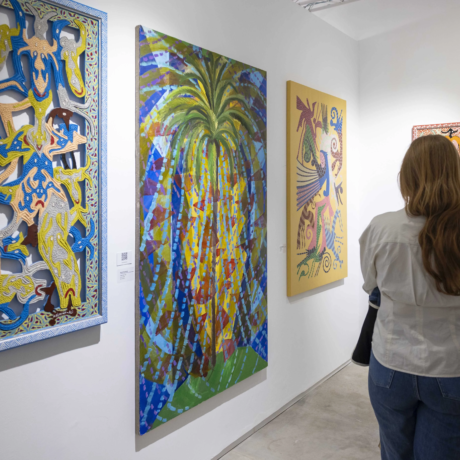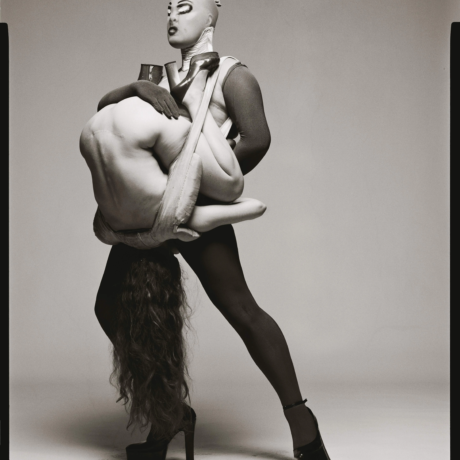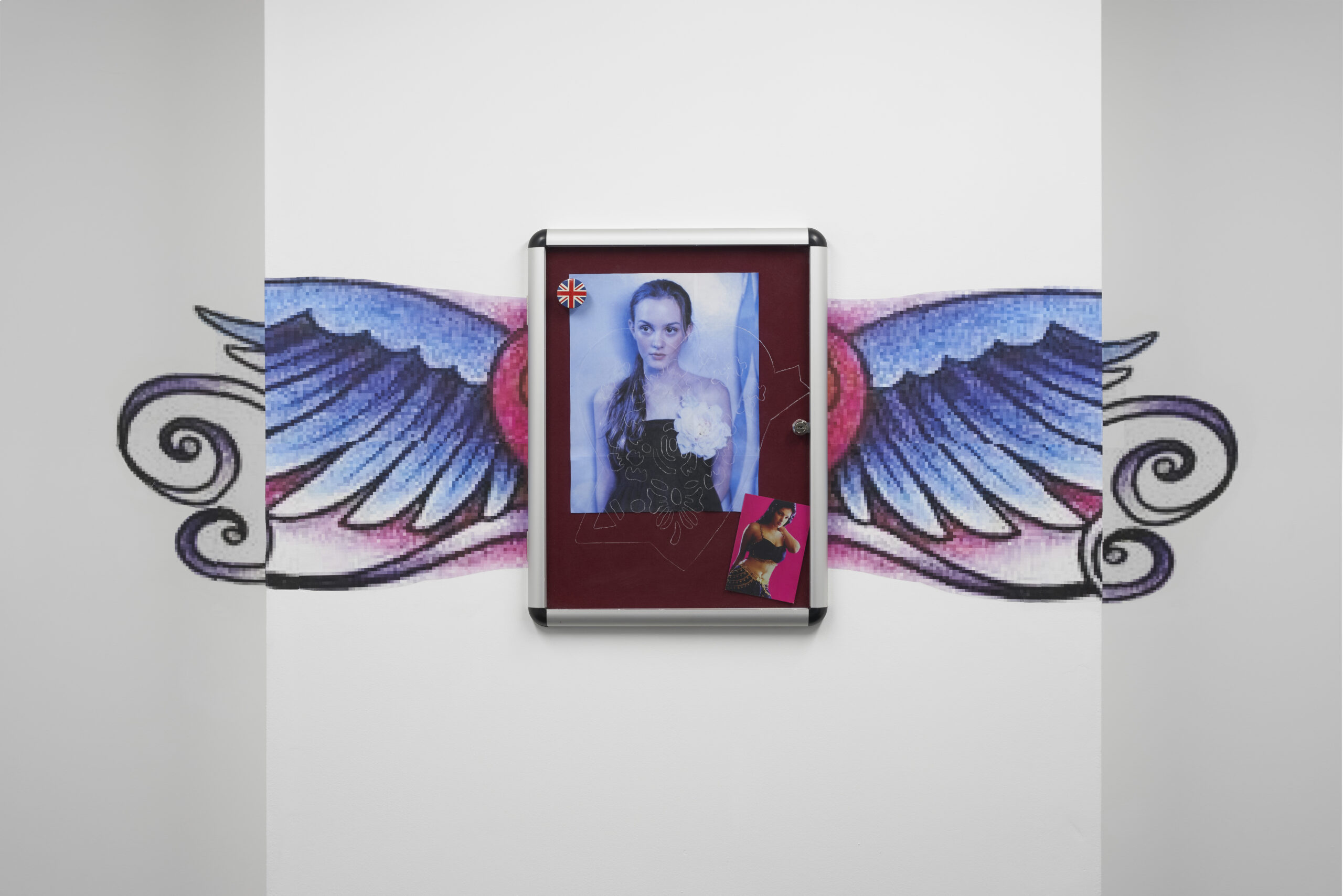
The title of Athen Kardashian and Nina Mhach Durban’s solo exhibition, I’ll Wear The Bangles From Your Hands, imitates the tenderness at the heart of their shared practice. It is a tenderness that is felt upon entering Soup Gallery, where it seems as though the ruins of a multi-day sleepover have been affectionately salvaged and arranged across the gallery’s two floors. Softly crushed Red Bull cans, Jacqueline Wilson novels, and Maybelline’s iconic Great Lash mascara are held within assemblages or delicately positioned in the space. Light switches are reverently decorated with Mickey Mouse pendants and mini bedazzled Ganesha stickers, and if you’re lucky, you might even spot the signed portrait of Elvis hanging above the door. Evidence of sustained fangirling abounds, and every surface is fair game.
In a back corner of the room, an enviable collection of DVDs, including Juno, Lilo & Stitch, and The Princess Diaries are bookended by a pink digicam, setting the stage for the artists to land a hefty punch of nostalgia. It is not hard to imagine the artists lounging on their stomachs on the gallery floor, legs kicking as they flick through issues of Vogue, Dazed, and Dolly: The Intimate Biography of Dolly Parton, before casting them aside, leaving a sanctum of youthful comfort in their wake.
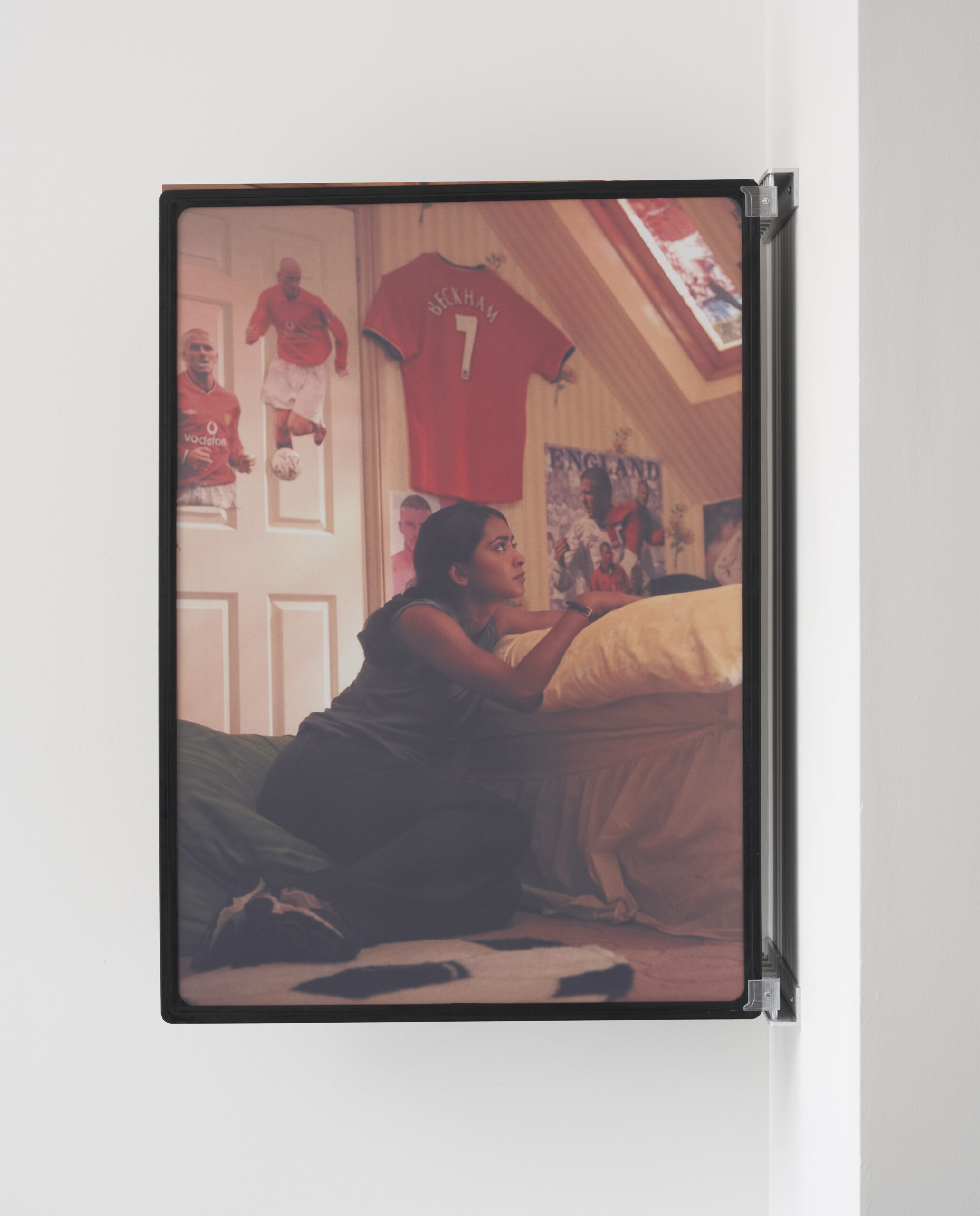
Raised in South London by Indian mothers, the artist duo deftly channel their noughties upbringing through arrays of objects that marry the accessibility of school notice boards with the solemnity of homemaking within immigrant communities. Henna stickers, charms, and grains of rice adorn stills from Bollywood classics or ethereal photos of iconic it-girls: think Lindsey Lohan, MIA, and Miley Cyrus in The Last Song. Throughout the exhibition, supposedly disparate mementoes sit side by side comfortably as the artists do the difficult work of reshaping girlhood in their image.
Dreamstime.com sees a stock image mounted on a felt notice board. The image is blown up, softly blurred, and bearing its watermark proudly. Within the image, a single hand sports a golden rose-shaped hand chain. The printout is further accessorised by parallel lines of gold drawing pins and bindis that exaggerate the preexisting glamour of the image. The display echoes the charm of a scrapbook page, and the watermark triggers the familiar feeling of loving a haphazardly sourced photo that you can’t imagine paying for. Nothing is beyond the realm of Athen and Nina’s pictorial re-appropriation—a privilege of growing up in the age of the internet. Dreamstime.com characterises a foundational play in Athen and Nina’s works where embellishments suggestive of their heritage flirt with the girly urge to click, collect and decorate.
All of Nina and Athen’s works float within frames: found cork boards, whiteboards, and second-hand notice boards, but also frames of reference, frames of mind —angsty, giggly, amorous— and shifting frames of identity, be it communal or personal. The artists luxuriate in the tricky business of coming of age, leaning into the melodramatics of adolescence without making fun of it. Present here is a Sofia Coppola-style exaltation of girlhood (a nod fittingly illustrated by the inclusion of the director’s 2000 photograph of Leighton Meester, inkjet printed by Nina’s mother at work). In Nina and Athen’s world, girlhood is not a lost period but one we remain tethered to and firmly alongside; it is endlessly generative.
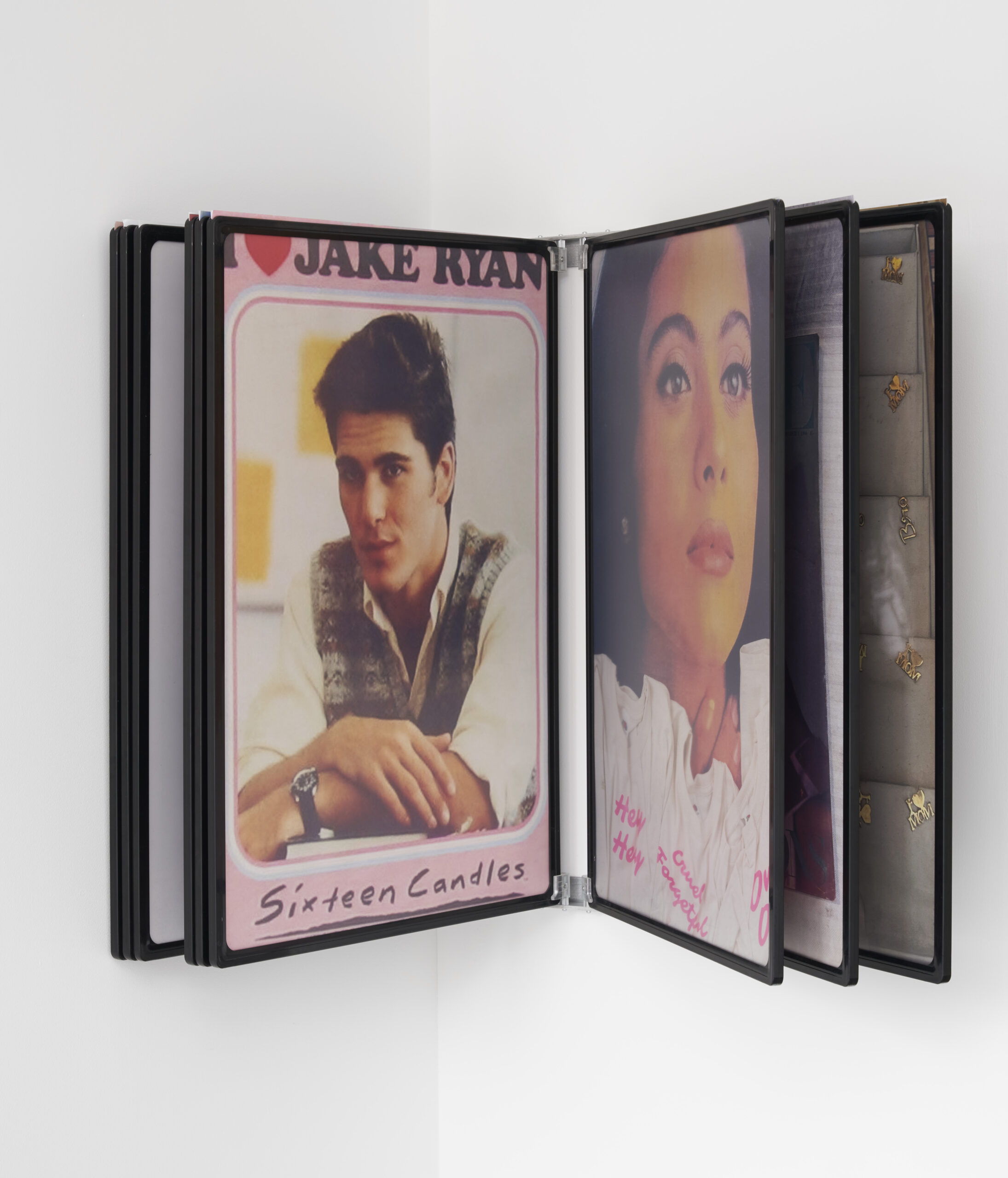
If girlhood is atemporal, my obsession with noughties-era romance is too. In in the mood for love, a lockable noticeboard sourced from eBay shows the gluey residue of its previous use. Yet the duo have carefully reanimated the frame, with gold stars placed on every corner and a gilded Aum sticker leaking off its edge. Operating as natural archivists, the artists’ unconscious associations and twinned sensibilities are evident in their chosen and cherished ephemera. In the centre of the noticeboard, the Blu-ray disc of Wong Kar-Wai’s In the Mood for Love resounds softly, sustaining the beating heart of the piece. The movie’s themes of yearning are further inscribed as the artists have etched Alex Turner’s canonical love letter to Alexa Chung on the transparent plastic of the notice board, lacing the DVD with a lustful edge that, once recognised, has the right audience grinning from ear to ear. An otherwise unremarkable noticeboard has been treated with the enchanting spell of love.
The artists’ cultural fluency is apparent in their seamless reference to arthouse film classics alongside Tumblr-grade poetry. They gracefully riff across popular memorabilia, spinning them into shimmering compositions that charm and disarm. The flashy emblems of pop culture—‘I <3 London’ badges, stickers, and baubles—belie the restraint with which the artists compose their assemblages. Contrary to the exuberance of old Bollywood glamour and fangirldom the artists often draw from, their works are controlled, glinting with a poised allure—like a teenage bedroom dipped in solvent.
Amongst Nina and Athen’s installations, I recognise the dignity with which my Nigerian mother sources and lays out her ornate trinkets in our home. Migrants often possess a heightened awareness of their domestic spaces, and the mammoth task of recreating a sense of home has historically been left to and then embraced by women in these households. My mother presents our home as she hopes to be taken in society—everything has its place, and things are pristine and respected. Nina and Athen embody the same level of care in the realisation and presentation of their work; only their references differ.
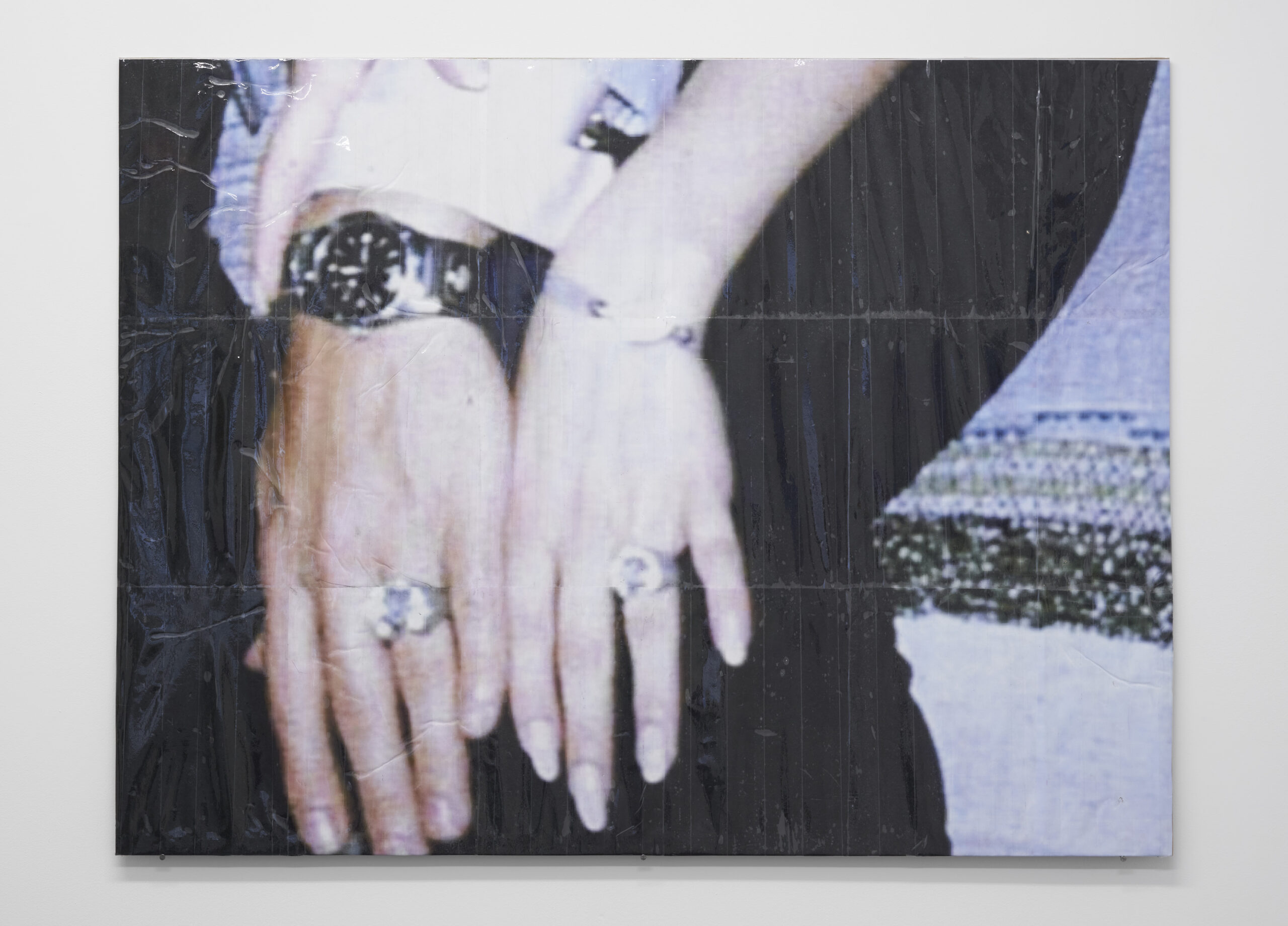
One particular oddity that has remained in my psyche is a playing card: a king of hearts emblazoned with Hrithik Roshan, the heartthrob of Kabhi Khushi Kabhie Gham. In the piece, Model Behaviour…….34, the card is placed alongside a Bend It Like Beckham poster and an image of Konnie Huq, the first Asian presenter of the BBC children’s program Blue Peter. The weathered edges of the objects feel profoundly intimate, as though the relics have been passed through the hands of cousins, aunties, and friends. They become a record of kinship and intergenerational care, and the question of what is ‘found’ and what is inherited lies latent in their compositions.
The artists’ process of assembling, translating, adapting, appropriating, and assimilating tokens of their dual heritage speaks to the enduring complexities of home for children of the Black and Brown diaspora. Their affinity for site-specific installations suggests an ongoing effort to ‘make home’, offering intersectional nuance to the idea of ‘coming of age.’ The artists define what moves them, what their influences are, and where they draw from, always in recognition of their maternal lineage and the domestic labour that lent them the freedom to do so. Hidden in the battered staircase that connects Soup Gallery’s two floors is what I see as the exhibition’s pièce d’oeuvre. The pair have scratched the words: “NINA + ATHEN WOZ ERE,” into an image of Reena Roy and Amitabh Bachchan, concisely and indelibly making their mark. I’ll Wear The Bangles From Your Hands is a shining culmination of Nina and Athen’s first year of collective practice. For those who linger and worship in these altars of cultural memory, the works will have you reminiscing on memories you forgot you held dear, leaving you rapt with nostalgia and abiding like an unrequited crush.
Written by Oluwatobiloba Ajayi


